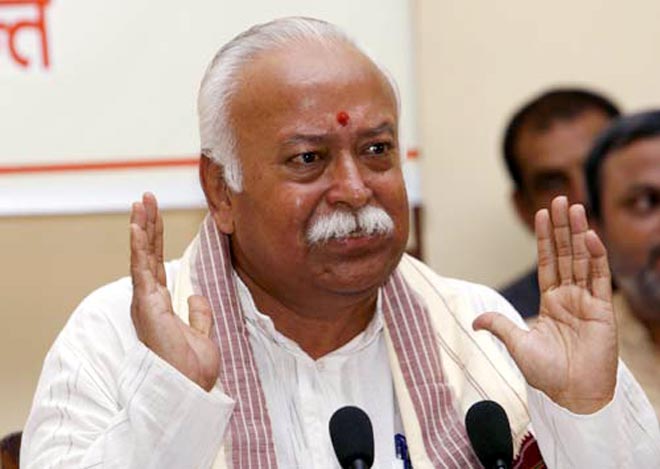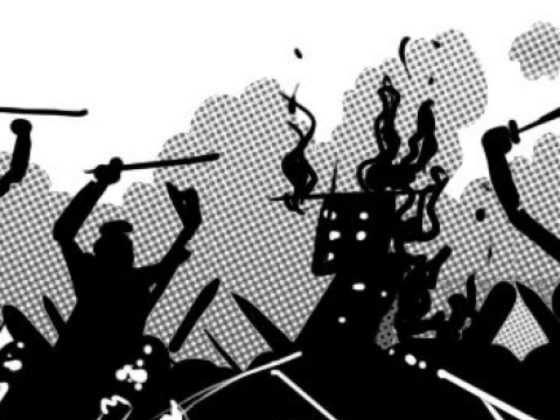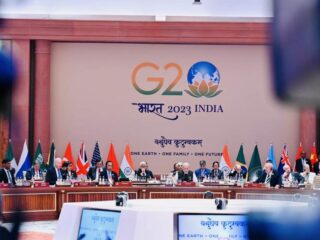Neha Dabhade
(Secular Perspective October 1-15, 2019)
RSS Chief, Mohan Bhagwat, recently addressed a meeting of journalists from international press. At the meeting, he discussed issues like the abrogation of article 370 in Kashmir, the outcome of the NRC exercise and Citizenship Amendment Bill to “fix” the situation, the construction of Ram Mandir etc. While Mr. Bhagwat stated the rhetorical position of the RSS on all these issues, what particularly stood out as surprising is his statement on women. He said, “Men do not have the capacity to decide the ways for upliftment of women. They themselves can only do so. Women are capable to take decisions related to them” (Times of India, 2019). This statement seems at odd with the ideas of RSS about women so far stated in public and reflected in its policy or conduct. RSS is known for its hyper-masculinized idea of nation and the subservient position it accords women in the framework of nationalism which is largely influenced by brahmanical patriarchy. Then how can one read his statement which seeks to highlight women’s agency and hail their capacity of decision making? After all it is the same RSS which is still an all male bastion and doesn’t include women in its rank. After much persuasion by Laxmibai kelkar, founding Sarsanghachalak (chief) of the Rashtriya Swayamsevak Sangh, Keshav B. Hedgewar advised her to form an all woman organization called Rashtra Sevika Samiti. The Samiti looks up to the RSS for its ideological roots and works as a subordinate organization.
In that case, what has changed? Is the character and nature of RSS changing? Is it becoming more inclusive and progressive? Or is there any particular reason why RSS organized such a meeting with only the foreign media in attendance? How can we make sense of the change portrayed by the RSS, the parent body of the ruling BJP? In order to answer these questions, it will be imperative to revisit the core of the RSS ideology and examine what are the factors which are non-negotiable for its raison d’etre and the principles that can be compromised. RSS, undoubtedly, in its almost 100 years of existence has evolved in myriad ways to bring under its ideological fold, different sections of the society like farmers, Dalits, Adivasis, women, workers which appear to be misfit with its ideological moorings. It will be interesting to discern in this complex trajectory that RSS has traversed over the years whether the position and role it gives women has remained the same or statements like the above is only reflecting a transient phase.
There is very insightful scholarship available on women, their roles and relationship between nationalism and gender. Scholars have studied the position of RSS via a vis women through its literature, thoughts of its ideologues and statements made by its high ranking official. Based on these, certain salient roles accorded to women can be clearly identified. But before going to these salient roles, let’s understand what Bhagwat means when he says that women can take decisions for their own upliftment. It can be interpreted as women have agency and equality in the society. Thus we are confronted with questions like the following: Do women have control over their choices of work? Control over their bodies? Are women equal to men in their families? Do they have the same rights as men in the families like property rights; choose the chores at home, free to choose their partners? Are they free from defined gender roles?
The answer is a resounding no. RSS like other organizations governed by supremacist ideology, imagines a nation based on exclusion and construction of an “other”. RSS calls itself an organization focusing on cultural nationalism and wants to establish a Hindu Rashtra through this nationalism. The basis of the Hindu Rashtra is exclusion and hatred against Muslims and other marginalized communities where Hindu religion will hold prominence and supremacy. The feminist analysis has revealed the gendered nature of nation and identities which constitute the nation. Hindu Rashtra which is the ultimate goal of the RSS is also imagined on socially constructed ideas of masculinity and femininity to shape female and male participation in nation building. Thus, Bharat is depicted as a mother- Bharat Mata by RSS.
Nation as woman also intersects the nationalist discourse through socially constructed ideas of honor. Women symbolize national honor, thus any act (e.g., rape) that defiles and violates women’s bodies becomes a political weapon aimed at destroying the enemy nation’s honor (Banerjee, 2003). Thus the narrative of the RSS that Bharat Mata is under threat from its internal enemies that is the Muslims, is used to polarize the society along religious identities and for political mobilization. This narrative and imagery of the nation influences how women are expected to participate in the nation and their overall role in the society. Women are primarily looked upon as wives and mothers having a significant role embedded in the family. In fact their status in society accrues to their conformity to culturally endorsed ideas of ‘‘wifehood’’ and ‘‘motherhood.’’
If women are primarily relegated to the private spaces of homes by RSS, then what explains the sizeable number of women following the RSS ideology? The project of nation building allows women to renegotiate access to public spaces. This access into political and social life is not a result of dismantling of patriarchal norms or structures or challenging patriarchy, but on the terms of Hindutva ideology and within the framework of Hindu Rashtra. The role and position of women remain unchanged though the RSS may allow them greater mobility or even take up masculine traits (thus the emphasis on self-defense classes and training of arms). The masculine traits are promoted only to an extent to promote a masculine culture towards the end of a Hindu Rashtra by construction and hyping the threat of Muslims who will defile Bharat Mata– an embodiment of virtues which all women should aim at emulating thus reinforcing patriarchy and all the structures promoting the same.
From the RSS’ conception of the Hindu Rashtra emerge the following primary roles assigned to women in the society. The singular focus on these roles and how they play out in already entrenched patriarchal structures is detrimental to decision making of women.
Concept of family:
For RSS, family is the basic and most important unit of society and bedrock of “Indian” values. The RSS had gone to an extent of implementing its project, “Kutumb Prabodhan”, or family awakening. This project was to strengthen the institution and structure of family. Along with prescribing food and conduct in family, it went on to prescribe the discussions that should take place in the family. “Family members can discuss about one’s family tree, gods and goddesses, sanskriti, dharma, or desh bhakti,’’ offers Ravindra Joshi, the co-convener for the project. Within the family too, the gender roles are well defined and any deviation is frowned upon. Woman’s primary duty irrespective of whether she is working outside the house is that of motherhood. “Purush ka hai bahar ka kaam karna, dhann ka kaam karna – paurush uska gunn hai. Stritiya, matritav ka gunn hai. Uss gunn ko aurat ko kabhi nahin bhoolna chahiye.” (A man’s job is to make money – masculinity is his quality, whereas a woman’s quality is motherhood. She should never forget that), said Rashtriya Sevika Samiti’s Uttar Shetra Karyavahika, Chandrakantha, who was the chief guest at the culmination of a training camp organized by the Rashtriya Sevika Samiti (Iyengar, 2017). In fact, any contestation that can disturb the family equilibrium (read as inequality) is shunned. For example, Samiti general secretary Seetha Annadanam is against allowing Hindu women a share in the ancestral property of their parents. “There should be a balance between women’s rights and our traditions, and this should be done on the basis of shastras. Otherwise, it would split our families and pit brothers against sisters.” (Bhardwaj, 2016)
She went on to say that marital rape doesn’t exist. Women have no say in sexual relationship with their husbands and have no right to refuse. Their refusal can affect “bliss” in the marriage. “There is nothing called marital rape. Marriage is a sacred bond. Coexistence should lead to bliss. If we are able to understand the concept of this bliss, then everything runs smooth.”
Mr. Bhagwat has in the past explained how women are subordinate in marriage and family as they can be disowned by the husband. “A husband and wife are involved in a contract under which the husband has said that you should take care of my house and I will take care of all your needs. I will keep you safe. So, the husband follows the contract terms. Till the time, the wife follows the contract, the husband stays with her, if the wife violates the contract, he can disown her,” Bhagwat said (Jha, 2013). If women are so inconsequential to be easily disowned without any rights of their own in a hierarchal structure of family as described by the RSS, does Mr. Bhagwat really think that women can make decisions?
Role as mother:
The centrality of motherhood to Hindu Rashtra and RSS is explained in some details above. Motherhood is important to RSS in two significant ways: Firstly, women can give birth to children and thus reproduce soldiers for the Hindu Rashtra. Secondly, mothers are expected to not only don the role of biological reproducers but also reproduce culture or “sankaras” during the upbringing of the children and espouse in them pride for Hindutva, Bharat’s glorious past and longing for a Hindu Rashtra (Banerjee, 2003). This explains the emphasis Mr. Bhagwat places on Hindu couples producing more children. Gripped by the fear that Hindus would be rendered a minority and overtaken by the Muslim population due to the relatively lower rate of fertility amongst Hindus, he warned, “If this remains the situation, one should forget about their existence in one’s own country by 2025” (Bhardwaj & Mishra, Indian Express, 2016).
Bhagwat himself endorsed the pivotal role of women as mothers when he made authoritative pronouncements on the woman’s central role of imparting sanskar (values) to children and, thereby, strengthening society and the nation. “Our kutumb vyavastha [family system] has caught the attention of the world,” he said (Jha D. , 2016).
Chastity:
Chastity and honour are the other qualities that the RSS upholds in a woman which determine the respect she enjoys in the society. Women are looked upon as bearers of identity and thus represent the honour of the community. It is expected that women don’t establish any relationships that bring “dishonour” to the community, thereby firmly controlling the bodies of women. It is no surprise then that the RSS has mounted an aggressive campaign against inter-religious marriages which it terms as “love jihad”. Such vocabulary and campaigns robs women of their agency and freedom to choose their partners and control over their bodies. Contradictory to his current thrust on women making their own decisions, he in a very patronizing manner called upon the society to warm women about “love jihad”. “Girls of the coming generation should be told the meaning of ‘Love Jihad’ and the ways to save themselves from their traps,” Bhagwat said (Economic Times, 2014).
On another occasion, Mr. Bhagwat links sexual violence to “western culture” and upholds the framework of values which are practiced in “Bharat”. “Where ‘Bharat’ becomes ‘India’ with the influence of western culture, these type of incidents happen. The actual Indian values and culture should be established at every stratum of society where women are treated as ‘mother’,” Bhagwat said explaining the causes of rape in India (Ghosh, 2013). This raises a question how much is a woman’s agency or decision making respected if sexual violence owing to patriarchy is not acknowledged for what it is in India.
Conclusion:
Hindu Rashtra is the raison d’etre of the RSS. And there are some non-negotiable in the Hindu Rashtra since these ideas are integral to its construction. The gendered construction of the Hindu Rashtra necessarily puts women in a subordinate position. Women are exalted by the RSS as goddesses and Bharatmata but these are empty facade. There is no empowerment since this façade allows patriarchy and patriarchal structures which oppress women go uncontested and further re-enforce them. And these very structures are basis of the cause espoused by RSS. Thus Bhagwat’s words are mere lip-service to portray to a foreign media that RSS is changing to become more liberal on issues like status of women. Incidentally, this meet was organized after the RSS Chief addressed the three days Conclave last year at “Bhavishya Ka Bharat – An RSS Perspective”, held at Delhi’s Vigyan Bhavan which was attended by prominent personalities. The attempt at this Conclave like in the meeting recently was to give the image of RSS a makeover and aimed at portraying the RSS as an organization with a vision of inclusion and unity of India. Here too Bhagwat presented views which may seem contradictory to RSS’ long held ideology and ideologues. This is an attempt to gain acceptance and legitimacy and divert international attention and condemnation from the turmoil in the country with 1.9 million residents in Assam facing the prospect of being rendered stateless as an outcome of NRC and ending up in the detention centres and from Kashmir still being under lockdown for over 60 days! These words from Mr. Bhagwat appear hollow and devoid of sincerity mocking at the oppression women face in India.
——————————————————–
Centre for Study of Society and Secularism
Mumbai







